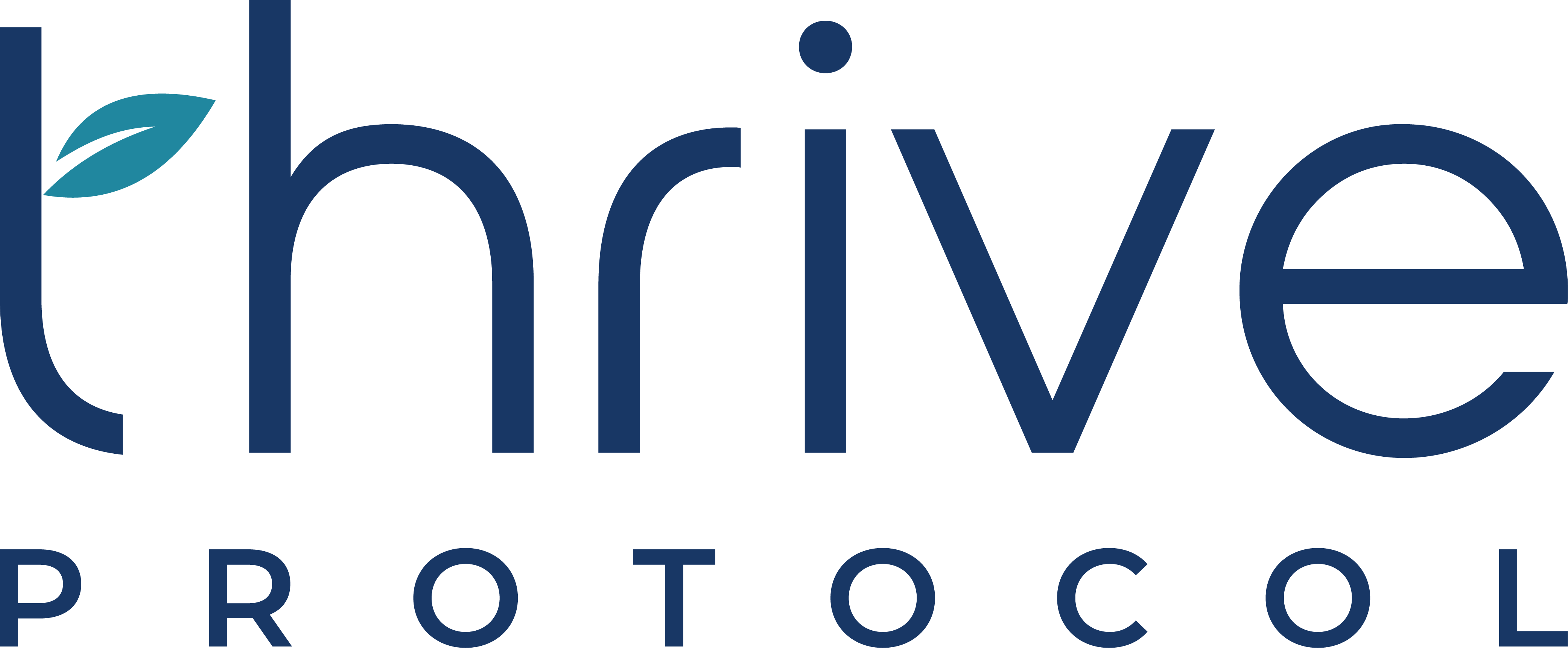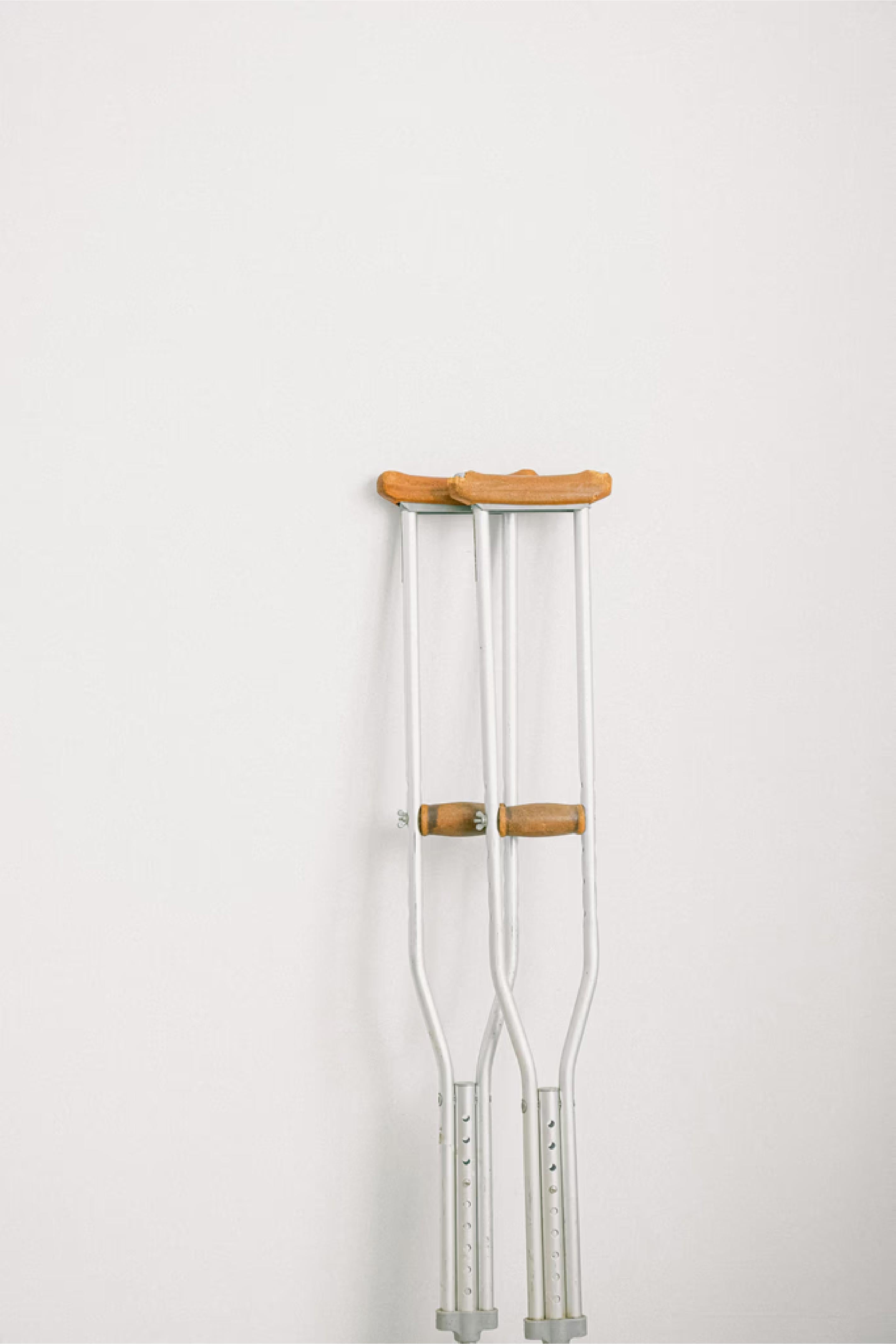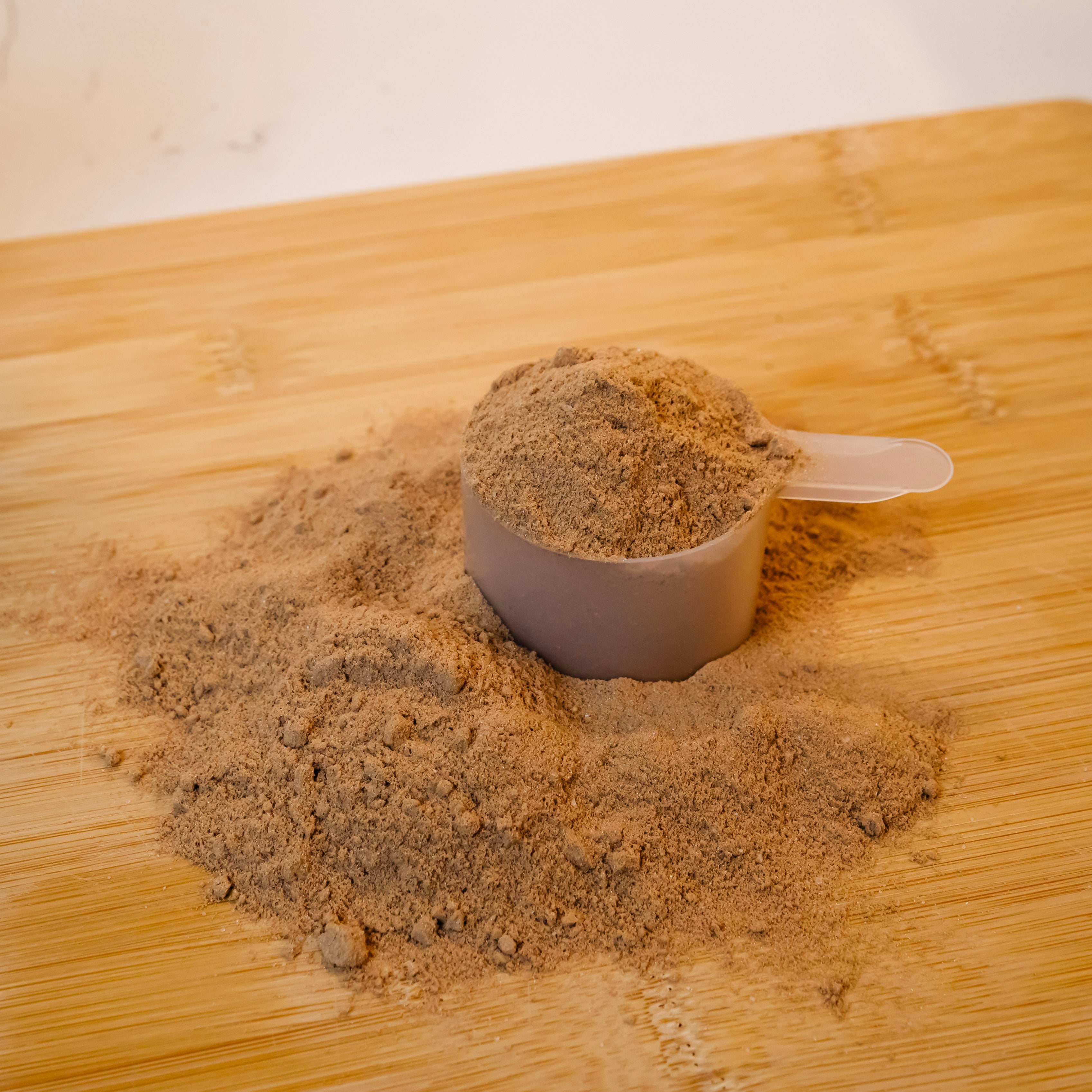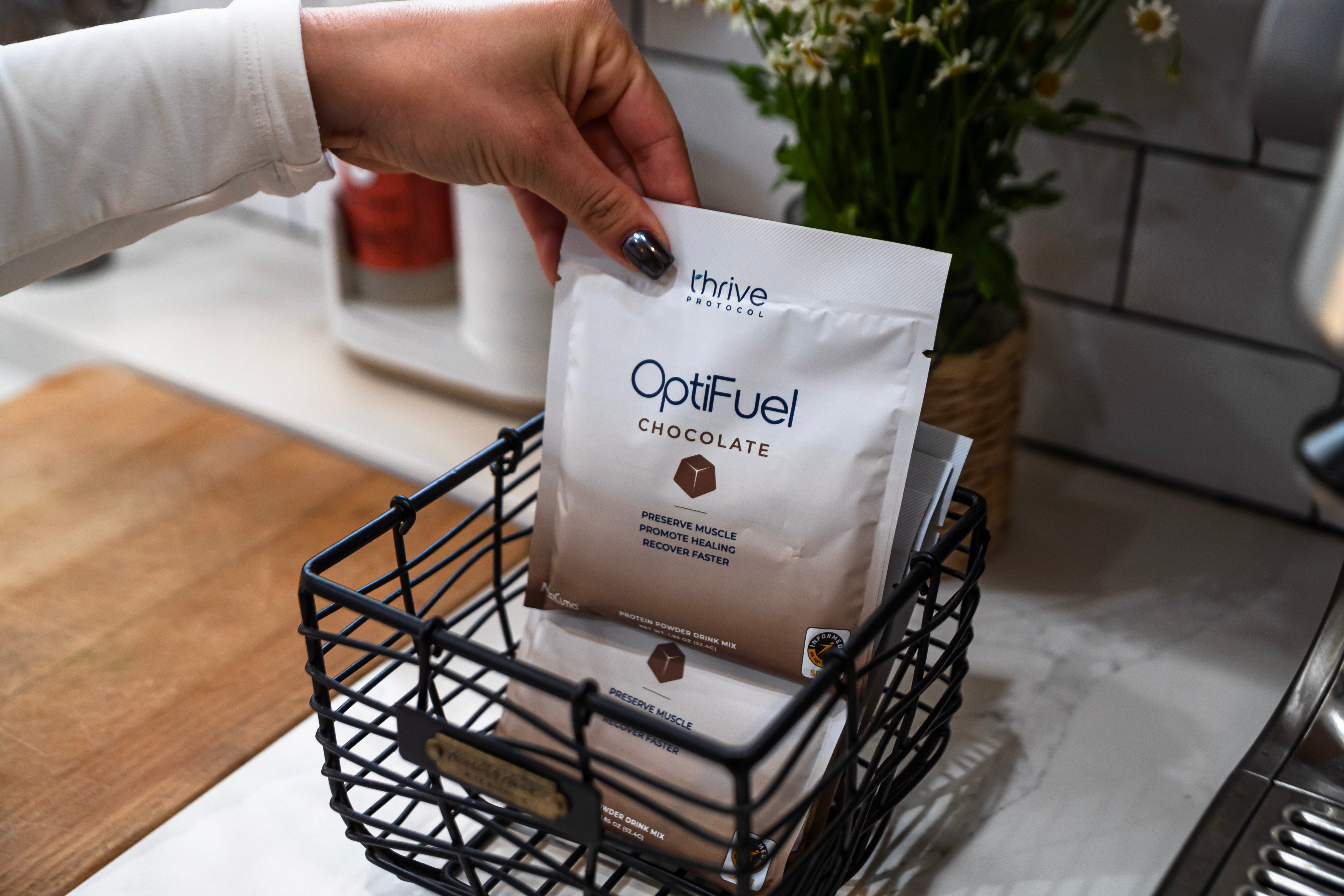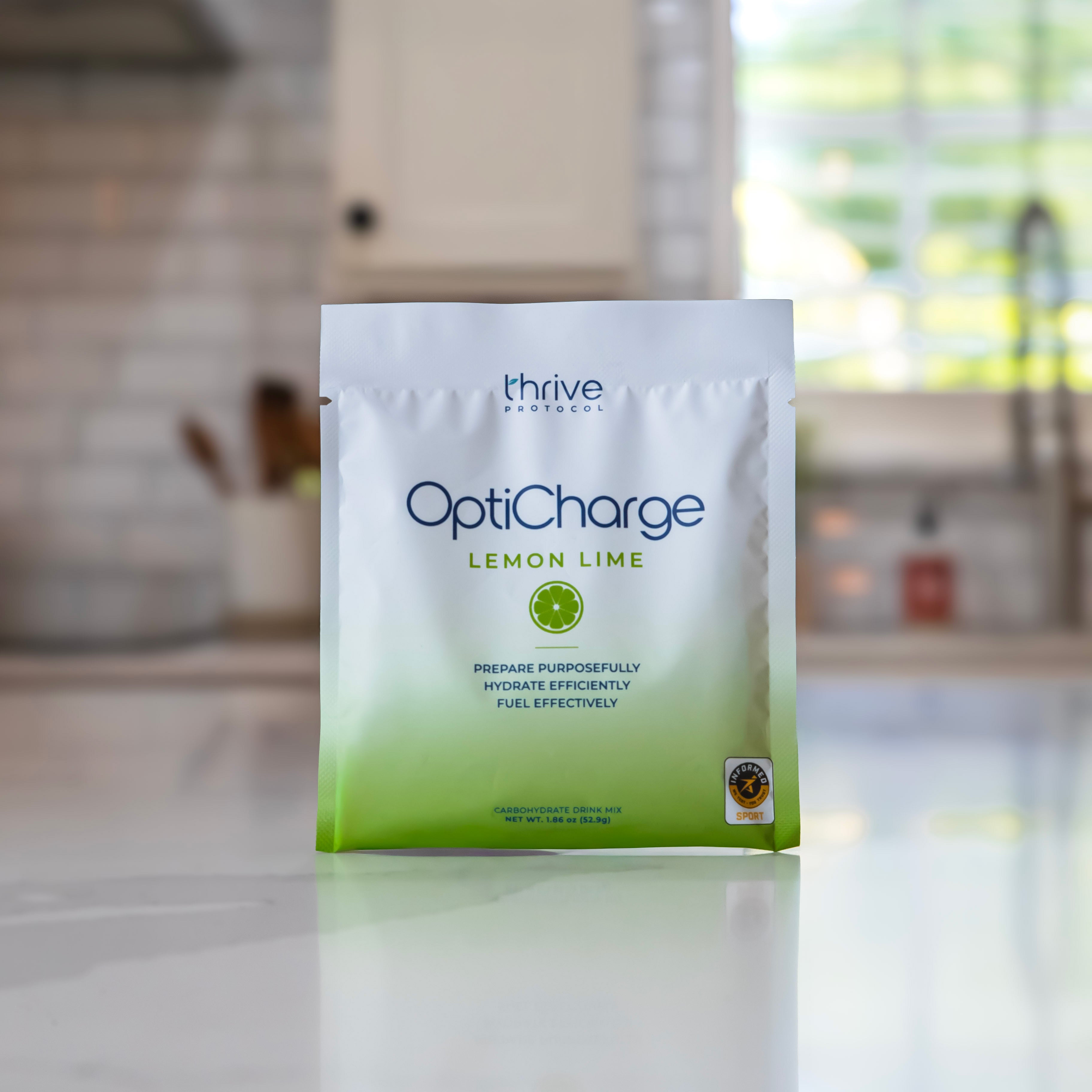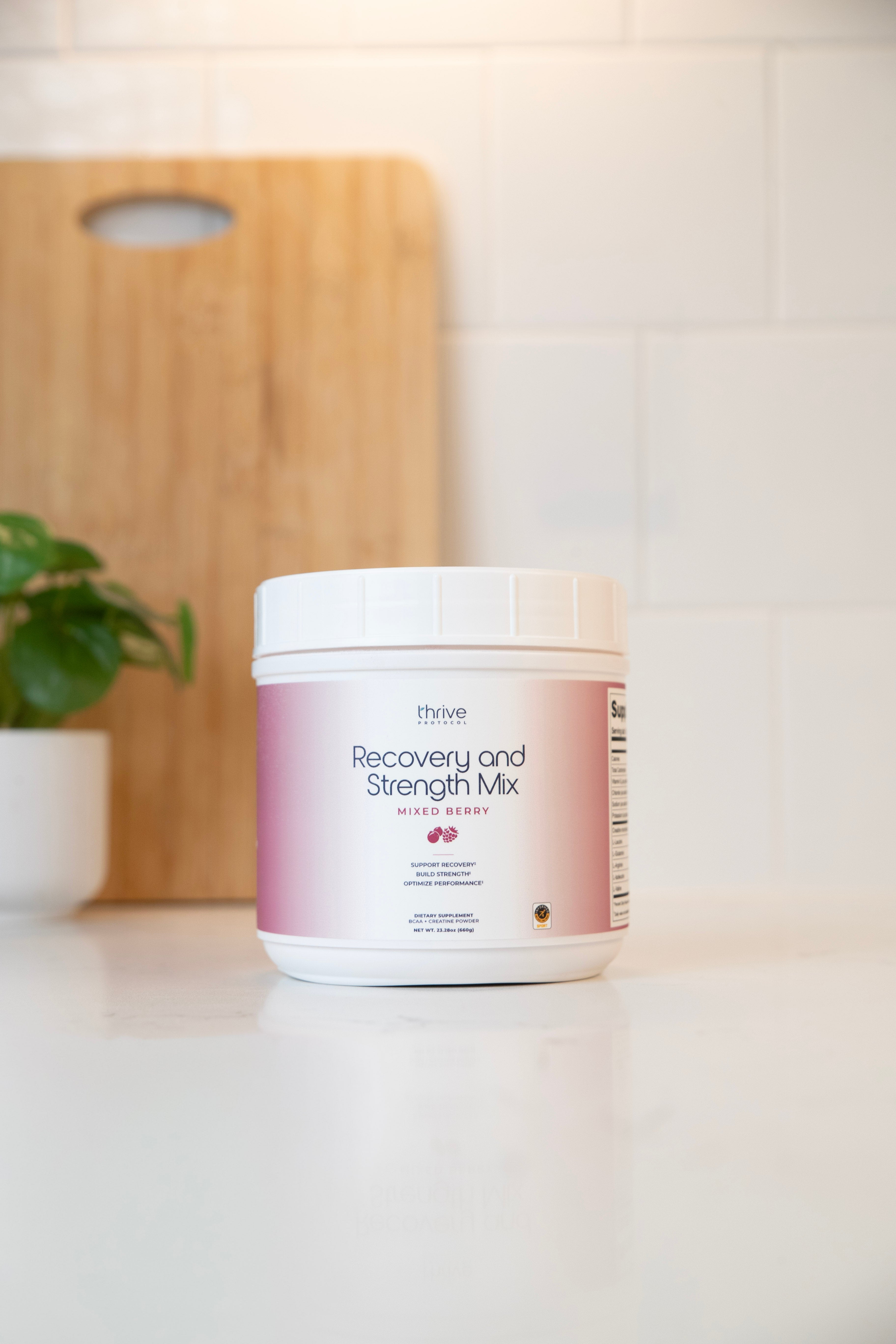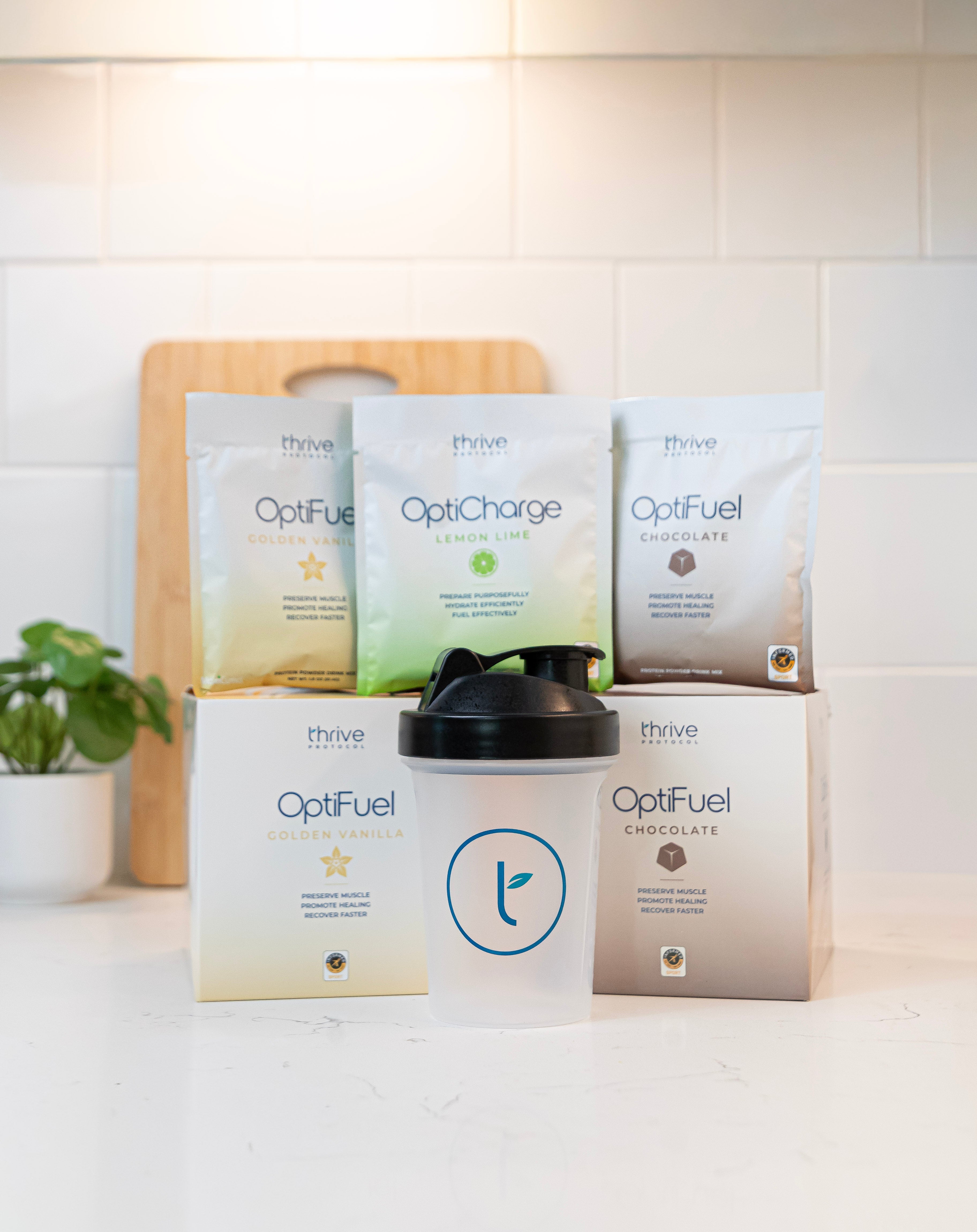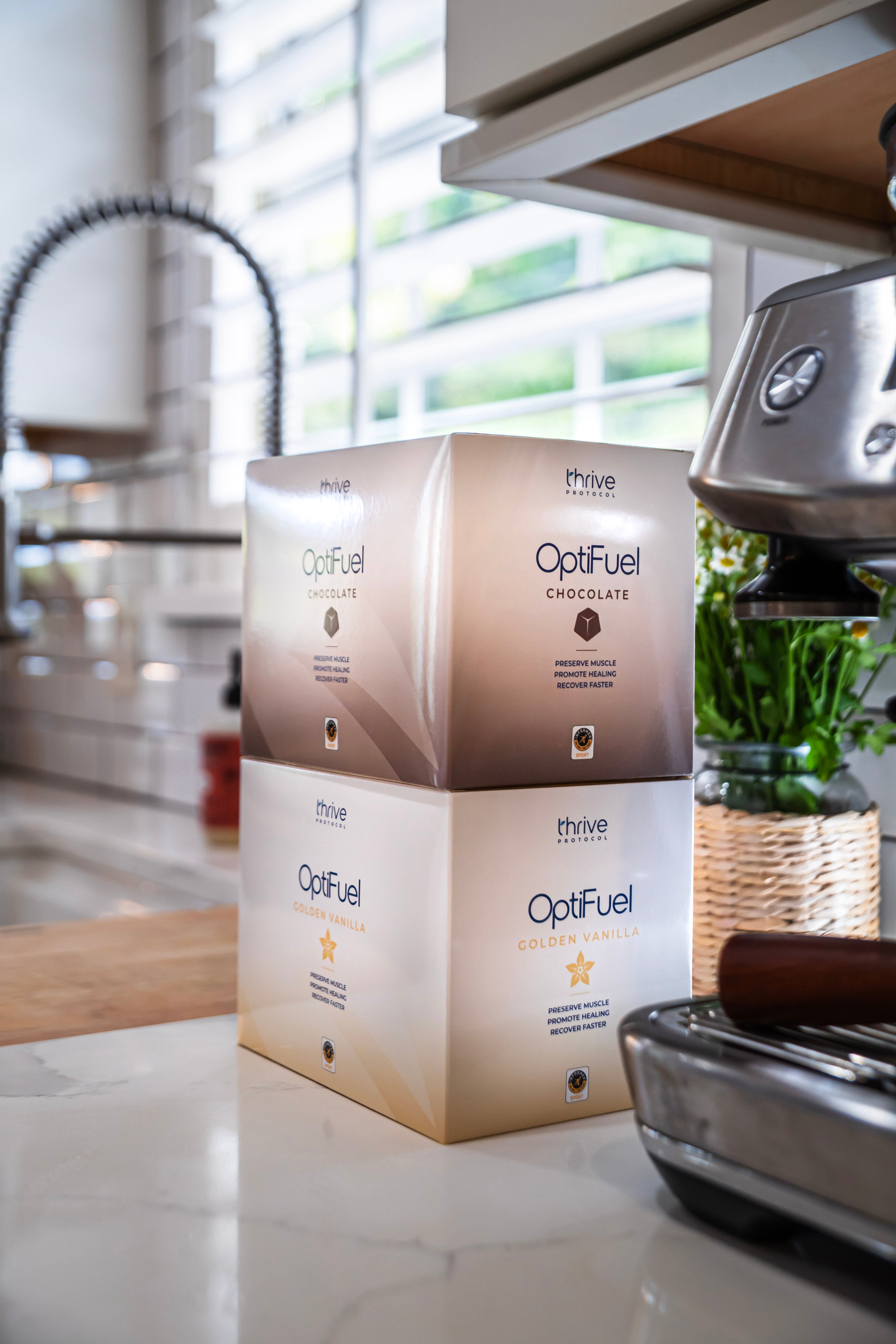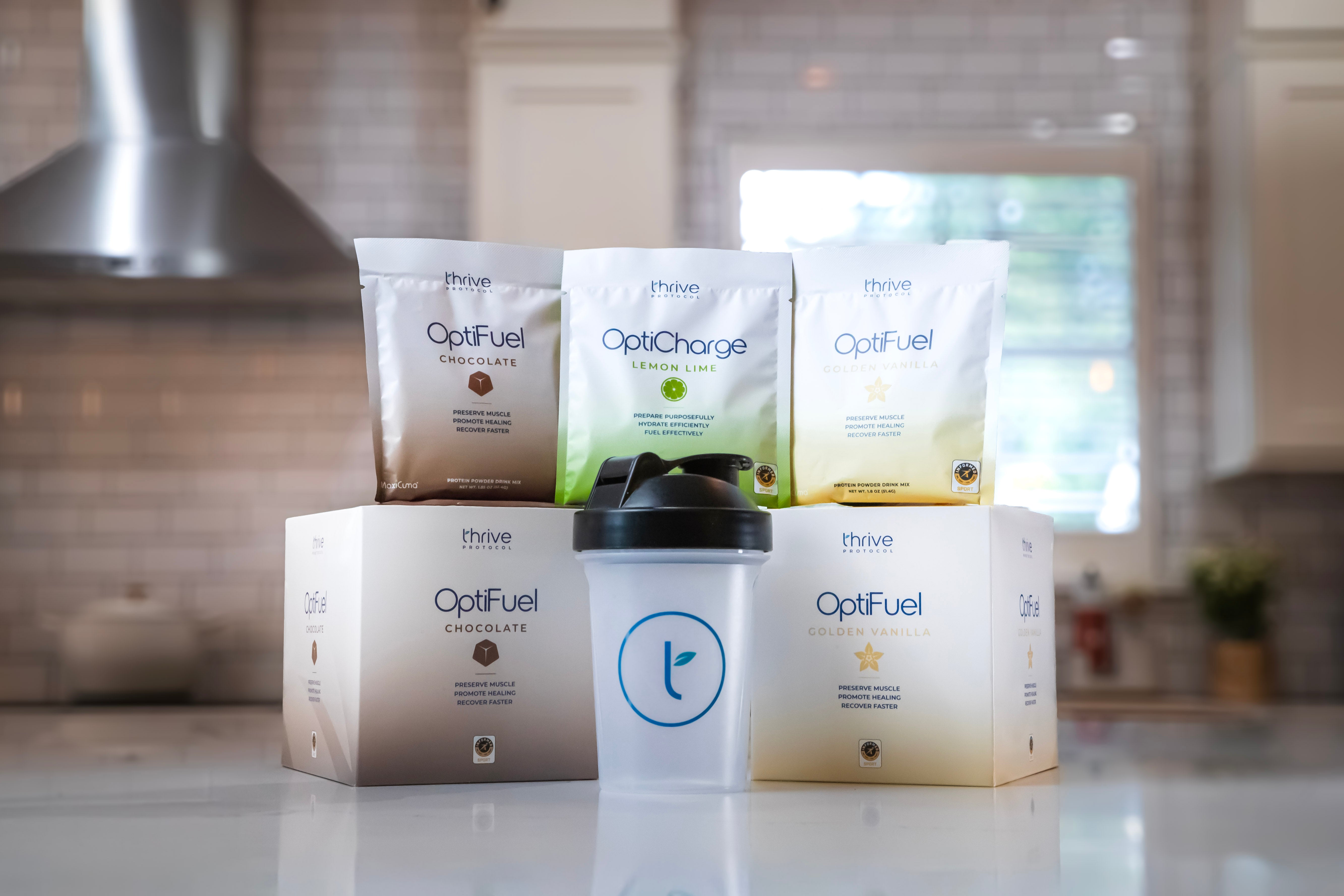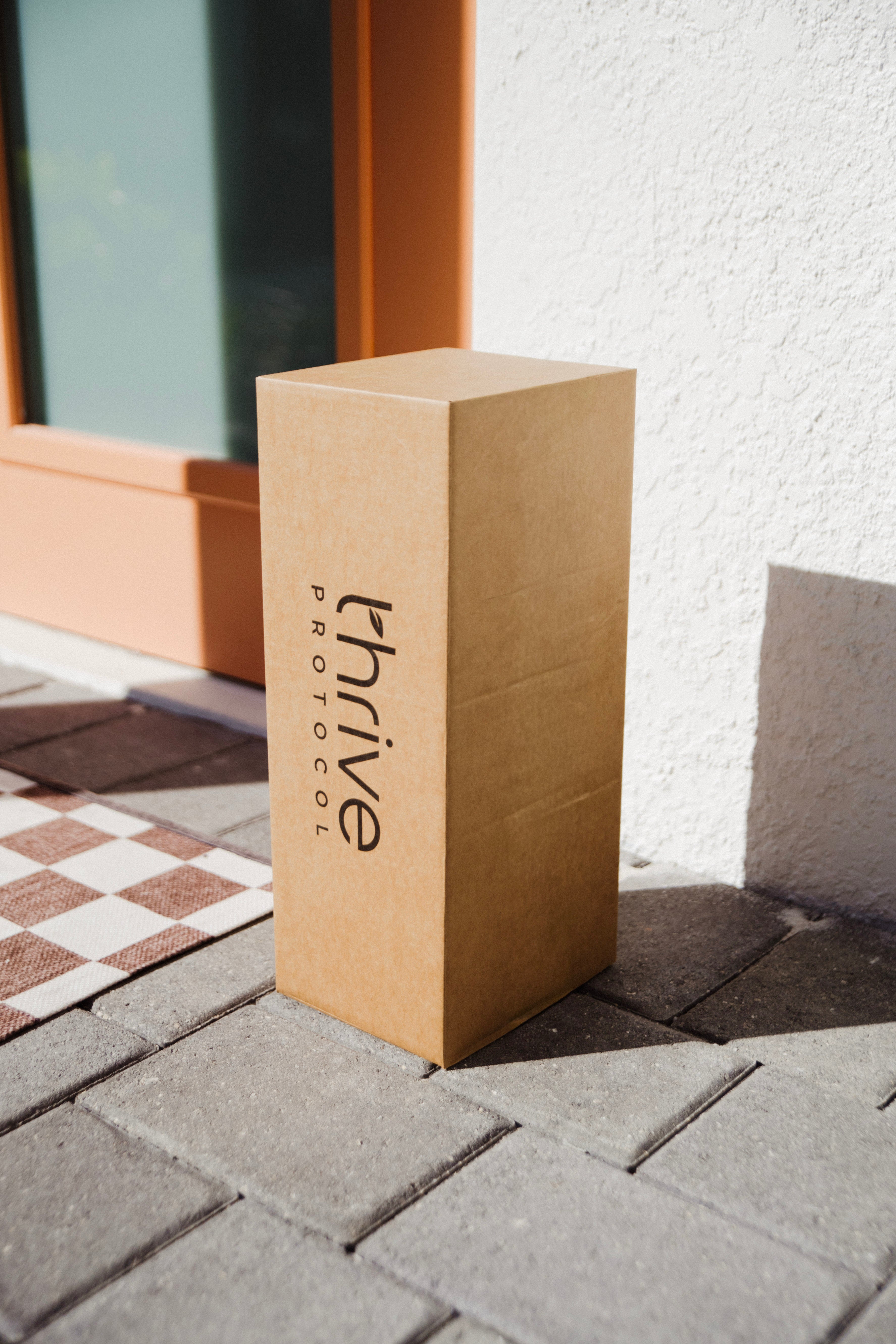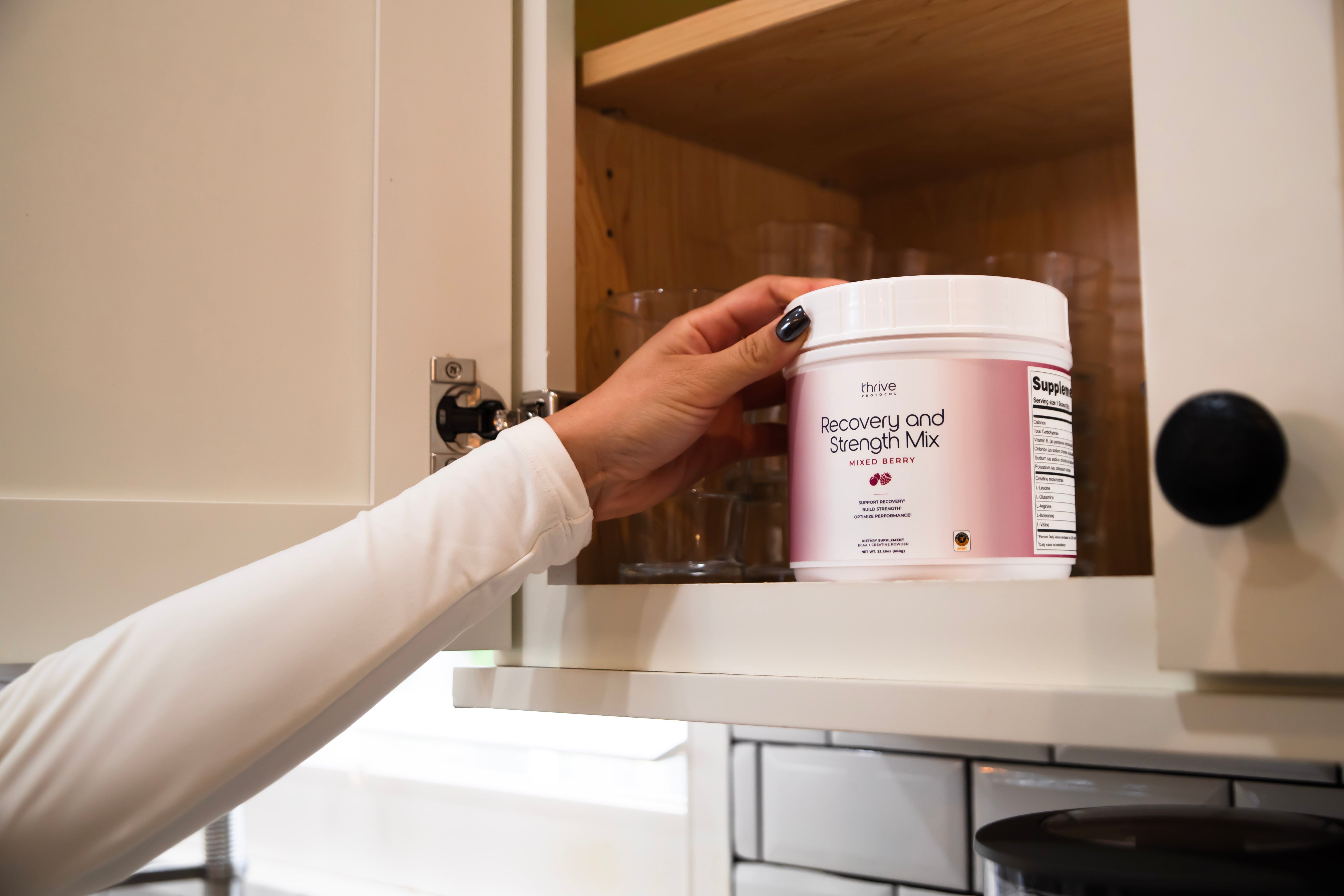Key Ingredients & Clinical Benefits
Whey Protein (25 g)
Provides essential amino acids that help rebuild muscle and repair tissue.
Studies show that supplementation with protein and amino acids after surgery leads to a faster recovery, improved speed of wound healing, and a 30% reduction.
Leucine (3.2 g)
The most important key amino acid in activating muscle protein synthesis. Preserve strength during inactivity.
Clinical studies show patients supplementing with leucine regained mobility nearly 3× faster.
Glutamine (3.7 g)
A vital fuel for muscle and immune cells under surgical stress.
Supplementation shortens hospital stay and lowers post-surgery infection rates.
Vitamin C
Required for collagen production and connective-tissue repair.
Clinical data show faster wound healing, up to a 42% reduction in pain, and 40% lower use of narcotic pain medication scores following surgery.
Vitamin D
Supports bone strength, immune defense, tendon health, and muscle function.
Deficiency triples re-tear rates after tendon repair and supplementation improves
healing.
Magnesium
Supports the nervous system and energy production.
Help restore normal sleep vital to recovery after surgery and may lower pain after
B Vitamins
Promotes energy metabolism, red-blood-cell formation, nerve repair, and important for regaining endurance.
Collagen Peptides
Provide structural building blocks for tendons, ligaments, and skin healing.
Clinical trials show >60% greater improvement in tendon size and strength when paired with exercise and 3.7x increase in wound healing time.
Omegas
Provide an anti-inflammatory effect and support muscle.
Supplementation after immobilization has been shown to decrease muscle loss by 43% and post-surgery supplementation has been shown to decrease inflammatory markers
Curcumin
Provides an anti-inflammatory effect as well as pain reduction.
Clinical studies show decreased inflammatory markers after surgery, lower rates of adhesions, and 50% reduction in pain
Key Ingredients & Clinical Benefits
Maltodextrin (Carbohydrate Loading)
Complex carbohydrate that pProvides energy during pre-surgeryoperative fasting or as a loading prior to an athletic event. Carbohydrate loading and provides immediate energy stores and prevents the body from breaking down muscle for fuel.
Patients who carbohydrate-load before surgery recover faster, have less pain, and leave the hospital sooner.
Electrolytes
Support hydration, stable blood pressure, and muscle function while fasting.
Key Ingredients & Clinical Benefits
Creatine (5 g)
Restores cellular energy and offsets muscle loss during immobilization.
Studies show up to 80% less strength loss in patients taking creatine during recover immobilization.
BCAAs (6.5 g)
Branched-chain amino acids that reduce soreness, speed tissue repair, and decrease fatigue.
- Leucine (3g) – Stimulates muscle protein synthesis and supports lean muscle development.
- Glutamine (2.5g) – Aids in immune support and speeds recovery by reducing muscle soreness.
- Arginine (2g) – Promotes nitric oxide production for improved blood flow and healing.
- Isoleucine (1.75g) - Works synergistically with leucine and valine to regulate energy, aid recovery, and support muscle tissue repair.
- Valine (1.75g) - Helps prevent muscle breakdown, supports endurance, and balances branched-chain amino acid (BCAA) utilization.
Thrive Protocol is developed by physicians and trusted by patients. Each ingredient is clinically validated to help you heal stronger, recover faster, and return to the life you love
Frequently Asked Questions
What Type of Surgery Benefits from Optimizing Nutrition?
What Type of Surgery or Injury Benefits from Optimizing Nutrition?
Surgery or injury places stress on the body. Healing is essentially this stress. Nutritional needs go up. Having the foundations for healing can reduce healing time and reduce complications. While the needs increase with the severity of injury or surgery, there really isn’t a downside to putting yourself in the best possible position to recover. Whether recovering from an ankle sprain or major surgery, you are in large part in control of your healing journey.
How Common Are Nutritional Deficits Prior To Surgery?
Most people overestimate their health and overlook how critical nutrition is for surgical recovery.
The data is clear:
- Nearly 50% of patients undergoing elective (planned) surgery have a nutritional deficiency.
- That number jumps to 90% for those having bariatric (stomach) surgery.
- Even 67% of young athletes (ages 8-18) show risk factors for poor nutrition
- In healthy young men muscle volume decreases 2% after 2 days of disuse
- Following TKA, muscle atrophy is 1% per day in patients over 65
- Protein requirements increase 50 to 100% after surgery
What Are The Benefits Of Nutrition Optimization Around Surgery?
- Broadly speaking, nutrition optimization (the core being protein supplementation and a pre-surgical carbohydrate drink) has been shown to improve speed of recovery, reduce complications, lower pain, and lower length of hospital stay. Conversely, studies do not find a detriment to protein supplementation or a carbohydrate drink. Even people with diabetes have been shown to benefit from a pre-surgical carbohydrate drink for instance. Said another way, there are no apparent downsides of nutritional optimization which is why we advocate it for all surgeries.
Why Hasn't My Surgeon Talked About Nutrition?
- This is a very common problem! There are several reasons. First, surgeons get only very basic education about nutrition in medical school. They do not receive any education on nutrition in residency. They are taught to think about surgery alone. Second, most surgeons are under significant time pressures with decreased reimbursement and thus don't take the time to discuss nutrition.
Does Nutrition Impact Spine Surgery Outcomes?
At a high-level data has shown the following with nutritional optimization:
Spine surgery - less pain and high rate of fusion
Khalooeifard R, Oraee-Yazdani S, Keikhaee M, Shariatpanahi ZV. Protein Supplement and Enhanced Recovery After Posterior Spine Fusion Surgery: A Randomized, Double-blind, Placebo-controlled Trial. Clin Spine Surg. 2022;35:E356-E362.
- Randomized controlled trial of protein supplementation in patients undergoing spine fusion surgery
- Fusion rate 6 months after surgery was 83% with protein supplementation compared to 60% without supplementation
- Infection rate 0% vs. 15%
- 15 day wound healing 100% vs. 5% (20x increase in wound healing)
Does Nutrition Impact Joint Replacement Outcomes?
Data shows quicker recovery and better outcomes 2 years after total hip or total knee replacement when nutrition is supplemented.
Ueyama H, Kanemoto N, Minoda Y, Taniguchi Y, Nakamura H. Perioperative Essential Amino Acid Supplementation Facilitates Quadriceps Muscle Strength and Volume Recovery After TKA: A Double-Blinded Randomized Controlled Trial. J Bone Joint Surg Am. Mar 1 2023;105(5):345-353.
- Randomized controlled trial of 60 patients undergoing TKA
- Half received amino acids 1 week prior and 2 weeks after surgery
- Muscle strength was higher and pain was lower 4 weeks after surgery with the use of EAA supplementation (p < .05)
- Quad strength improvement was 2x higher 2 years after surgery in the amino acid group
Aziz A, Bluhm JB, Williamson TK, et al. Effects of Malnutrition on Perioperative Outcomes of Total Hip Arthroplasty: A Systematic Review and Meta-Analysis. Arthroplast Today. Jun 2025;33:101667.
- Systematic review of ~500,000 Total Hip Patients
- Malnutrition associated with ↑ rates of:
- Non-home discharge (19% increase)
- Readmission(14% increase)
- Pulmonary complications (54% increase)
- Transfusion (25% increase)
- Reoperation (28% increase)
- Mortality (105% increase)
Does Nutrition Impact Outcomes after Trama Surgery (Surgery for Broken Bones)?
Studies show lower complications, higher union, and faster recovery with supplementation following surgery for fractures or broken bones.
Hendrickson NR, Davison J, Glass NA, et al. Conditionally Essential Amino Acid Supplementation Reduces Postoperative Complications and Muscle Wasting After Fracture Fixation: A Randomized Controlled Trial. J Bone Joint Surg Am. May 4 2022;104(9):759-766. Doi:10.2106/JBJS.21.0101411
- 400 patients undergoing fracture fixation were randomized to receive EAA supplementation for 2 weeks after surgery
- Complications were reduced in the EAA group (31% vs. 44%; p = .008). A 30% reduction in complications
Ekinci O, Yanik S, Terzioglu Bebitoglu B, Yilmaz Akyuz E, Dokuyucu A, Erdem S. Effect of Calcium beta- Hydroxy-beta-Methylbutyrate (CaHMB), Vitamin D, and Protein Supplementation on Postoperative Immobilization in Malnourished Older Adult Patients With Hip Fracture: A Randomized Controlled Study. Nutr Clin Pract. Dec 2016;31(6):829-835. Doi:10.1177/08845336166296287
- Randomized controlled trial of protein supplementation for 30 days after surgery in hip fracture patients.
- Half received supplementation with Protein (36g) high in Leucine (3g) and Vitamin D
- 81% of patients in the supplementation group were mobile 15 days after surgery compared to 27% in the control group. In other words, 3X more likely to be mobile 2 weeks after surgery with protein and amino acids
- Wound healing time was reduced by 1 day in the supplementation group (9% faster)
Does Nutrition Impact Outcomes after Shoulder Surgery?
Data suggests that nutrition is more important than age and tear size in healing after rotator cuff repair. Additional studies show that Vitamin D and Vitamin C are important for tendon healing.
Shitara H, Ichinose T, Sasaki T, et al. Preoperative Nutrition Impacts Retear Rate After Arthroscopic Rotator Cuff Repair. J Bone Joint Surg Am. Aug 30 2024.
- Retrospective study of 143 patients with postoperative MRIs
- GNRI (nutritional index) calculated in all patients
- 21% of patients were classified as having poor nutrition
- The association of nutrition with healing was STRONGER than tear size
- The risk was 3 to 6x higher with poor nutrition
- There was no association with age and healing
Does Nutrition Impact Outcomes after Foot and Ankle Surgery?
Foot and ankle - Vitamin D and nutritional status have been associated with lower union
Bertelli HD, Aquino JLB, Leandro-Merhi VA. Lower 25-hydroxyvitamin D (25OHD) levels, diabetes and age are associated with foot and ankle fracture treatment complications. Arch Endocrinol Metab. Sep 25 2023;67(5):e220020. doi:10.20945/2359-4292-2022-00201
- Prospective evaluation of 108 patients undergoing foot or ankle fracture treatment
- Low vitamin D level was associated with nonunion
Pereira DE, Smadi Z, Millar A, Haj Shehadeh T, Alsaidi A, Strelzow J. Preoperative malnutrition is associated with increased treatment failure and salvage procedures following surgical fixation of ankle and pilon fractures. Injury. Dec 2025;56(12):112888.
- 80,761 ankle fracture patients (7,455 malnourished; 73,306 controls) and 14,258 pilon fracture patients (1,648 malnourished; 12,610 controls) were identified
- In the ankle fracture analysis, malnourished patients had higher rates of wound complications, post-operative infection, anemia, blood transfusions, incision and drainage and implant removal at 90 days post-operatively (p<0.0001)
- Within one year, malnutrition was significantly associated with increased malunion, non-union, amputation and implant related complications such infections, implant removal and irritation and debridement (p<0.05)
- Comparisons for pilon fracture patients were the same in addition to higher rates of wound complications (p<0.001) in malnourished patients
Does Nutrition Impact Outcomes of Cancer Surgery?
Cancer represents a depleted state. The needs for recovery are even more extreme. Several studies have shown that nutritional supplementation improves outcomes.
Tan S, Meng Q, Jiang Y, Zhuang Q, Xi Q, Xu J, et al. Impact of oral nutritional supplements in post-discharge patients at nutritional risk following colorectal cancer surgery: A randomised clinical trial. Clin Nutr. 2021;40:47-53.7
- RCT of 212 patients undergoing surgery for colorectal cancer ½ supplemented with high protein/vitamin complex
- At 3 months post-op, the skeletal muscle index in the supplementation group was significantly higher than that in the control group (39.75 ± 5.83 vs 38.01 ± 6.18 cm2/m2, P=0.037),
- The supplemented group had a significantly lower sarcopenia prevalence (28.6% vs 42.1%, P = 0.040).
- The number of patients undergoing postoperative chemotherapy in the two groups was similar, but chemotherapy modifications, such as delay, dose reduction, or termination, were significantly reduced in the supplementation group (21.2% vs 36.8%, P=0.024).
Zhang G, Zhao B, Deng T, He X, Chen Y, Zhong C, et al. Impact of perioperative immunonutrition on postoperative outcomes in pancreaticoduodenectomy: a systematic review and meta-analysis of randomized controlled trials. BMC Gastroenterol. 2024;24:412.8
- Systematic review of 10 RCTs with 574 patients, 288 receiving nutrition supplementation and 283 controls
- A significantly lower incidence of postoperative infection-related complications (OR = 0.45; 95% CI: 0.27–0.74; P = 0.002) and severe postoperative complications (OR = 0.61; 95% CI: 0.38–0.98; P = 0.04) were seen the immunonutrition group compared to the control group.
- Patients in the immunonutrition group had a significantly shorter length of hospital stay (MD= -1.87; 95%CI -3.29 - -0.44; P = 0.01).
Gillis C, Loiselle SE, Fiore JF, Jr., Awasthi R, Wykes L, Liberman AS, et al. Prehabilitation with Whey Protein Supplementation on Perioperative Functional Exercise Capacity in Patients Undergoing Colorectal Resection for Cancer: A Pilot Double-Blinded Randomized Placebo-Controlled Trial. J Acad Nutr Diet. 2016;116:802-12.10
- RCT of 48 patients undergoing surgery for non-metastatic colorectal cancer
- Whey protein used 4 weeks prior and 4 weeks after surgery
- The whey group experienced a mean improvement in functional walking capacity before surgery of 20.8 m and the placebo group improved by 1.2m (P=0.27).
Matsui R, Sagawa M, Inaki N, Fukunaga T, Nunobe S. Impact of Perioperative Immunonutrition on Postoperative Outcomes in Patients with Upper Gastrointestinal Cancer: A Systematic Review and Meta-Analysis of Randomized Controlled Trials. Nutrients. 2024;16.13
- Systematic review of 23 RCTs
- Immunonutrition reduced infectious complications (relative risk ratio: 0.72; 95% confidence interval: 0.57–0.92; certainty of evidence: Moderate) compared with standard nutritional therapy
Does Nutrition Impact Outcomes of General Surgery?
Several studies have shown that nutrition plays a role in outcomes after gastrointestinal surgery. One of the issues with surgery on the gastrointestinal tract is limited caloric intake after surgery. Therefore, there is a larger need to offset with high quality protein. Data has shown the importance of nutrition on stomach surgery, pancreas surgery, and colorectal surgery.
Shen Y, Cong Z, Ge Q, et al. Effect of nutrition-based prehabilitation on the postoperative outcomes of patients with esophagogastric cancer undergoing surgery: A systematic review and meta-analysis. Cancer Med. Jul 2024;13(14):e70023.
- Eight studies met the eligibility criteria, with five randomized controlled trials (RCTs) and three cohort studies. In total, 661 patients were included.
- Any prehabilitation, that is, unimodal (only nutrition) and multimodal prehabilitation, collectively decreased the risk of any postoperative complication by 23% (95% confidence interval [CI] = 0.66-0.90)
- Any prehabilitation significantly decreased the length of hospital stay (LOS) (weighted mean difference = -0.77, 95% CI = -1.46 to -0.09)
Zhang G, Zhao B, Deng T, et al. Impact of perioperative immunonutrition on postoperative outcomes in pancreaticoduodenectomy: a systematic review and meta-analysis of randomized controlled trials. BMC Gastroenterol. Nov 16 2024;24(1):412.
- The analysis included a total of 10 RCTs with 574 patients
- 288 were in the immunonutrition group
- 283 in the control group
- The meta-analysis revealed a significantly lower incidence of:
- Postoperative infection-related complications (OR = 0.45; 95% CI: 0.27–0.74; P = 0.002)
- Severe postoperative complications (OR = 0.61; 95% CI: 0.38–0.98; P = 0.04) in the immunonutrition group compared to the control group
- Additionally, patients in the immunonutrition group had a significantly shorter length of hospital stay (MD= -1.87; 95%CI -3.29 - -0.44; P = 0.01)
Crocetti D, Carbotta G, Cantelli F, et al. Dietary Protein Supplementation Helps in Muscle Thickness Regain after Abdominal Wall Reconstruction for Incisional Hernia. Am Surg. Mar 1 2020;86(3):232- 236
- Forty-five patients undergoing elected abdominal wall reconstruction were prospectively divided into two groups:
- Group A patients had a standard 2300 kcal diet with 103 g of protein intake (males) and 1800 kcal diet with 80 g of protein intake starting one month before surgery and lasting for three months postoperatively
- Group B patients had the same dietary regimen plus 34 g of purified proteins daily
- At six months after surgery, Group B patients showed a significant difference in muscle thickening (13% vs 32%, P < 0.05 )
Kumar SM, Anandhi A, Sureshkumar S, Keerthi AR, Raja K, Jha AK, et al. Effect of preoperative oral carbohydrate loading on postoperative insulin resistance, patient-perceived well-being, and surgical outcomes in elective colorectal surgery: a randomized controlled trial. J Gastrointest Surg. 2024;28:1654-60
- Randomized controlled trial of 72 patients undergoing colorectal surgery
- In the oral carbohydrate load (OCL) group, there was a statistically significant decrease in postoperative IR on the, POD-1, and POD-3 (P = .0336).
- Inflammatory parameters were found to be significantly lower in the OCL group (P < .001).
- Clinical parameters, such as thirst, hunger, and day of surgery, and dry mouth were significantly lower in the intervention group (P =.00), with a shortened length of stay
Gillis C, Loiselle SE, Fiore JF, Jr., et al. Prehabilitation with Whey Protein Supplementation on Perioperative Functional Exercise Capacity in Patients Undergoing Colorectal Resection for Cancer: A Pilot Double-Blinded Randomized Placebo-Controlled Trial. J Acad Nutr Diet. May 2016;116(5):802- 12. doi:10.1016/j.jand.2015.06.00720
- 48 patients undergoing non-cancer elective colorectal surgery
- Supplementation began 4 weeks before surgery and continued for 4 weeks after surgery
- The whey group experienced a mean improvement in functional walking capacity before surgery of +20.8 m, with a standard deviation of 42.6 m, and the placebo group improved by +1.2 (65.5) m (P=0.27)
Tan S, Meng Q, Jiang Y, Zhuang Q, Xi Q, Xu J, et al. Impact of oral nutritional supplements in post-discharge patients at nutritional risk following colorectal cancer surgery: A randomised clinical trial. Clin Nutr. 2021;40:47-53.
- RCT of 212 patients undergoing surgery for colorectal cancer
- ½ supplemented with high protein/vitamin complex
- At 3 months post-op, the skeletal muscle index in the supplementation group was significantly higher than that in the control group (39.75 ± 5.83 vs 38.01 ± 6.18 cm2/m2, P=0.037)
- The supplemented group had a significantly lower sarcopenia prevalence (28.6% vs 42.1%, P = 0.040).
- The number of patients undergoing postoperative chemotherapy in the two groups was similar, but chemotherapy modifications, such as delay, dose reduction, or termination, were significantly reduced in the supplementation group (21.2% vs 36.8%, P=0.024).
Does Nutrition Impact Outcomes of Heart Surgery?
In a study from Korea, patients with nutritional risk factors had increased mortality over a follow-up period of an average of 4.5 years. Specifically, mortality rates of 10.2% (220/2,158), 22.7% (543/2,395), and 35.3% (273/774) were observed in the low-, intermediate, and high-risk groups, respectively. Interestingly, 59% of patients were at an intermediate or high risk of nutritional deficiency which shows that nutritional deficiency is common in patients undergoing heart surgery. Reference
Enhanced recovery protocols for cardiac surgery recommend optimizing nutrition and consuming a carbohydrate drink the night prior to surgery. Reference
Does Nutrition Impact Outcomes of Oral Surgery?
Eating well after oral surgery can be difficult. Data indicates that protein supplementation leads to lower weight loss after oral surgery. Reference
Does Nutrition Impact Outcomes after Plastic Surgery?
The association between nutrition and outcomes after plastic surgery has not been well-studied. However, at a basic science level it would make sense that nutritional optimization can improve outcomes. Protein and vitamins are the building blocks for wound healing. Additionally, studies in other fields have shown that nutritional optimization improves wound healing.
Wound Healing
What is Wound Healing?
Wound healing involves a series of events. Notable requirements include cell proliferation and alignment of collagen. While a variety of factors are important to wound healing, nutrition plays an important role. Protein deficiency affects the immune system and delays wound healing. Several amino acids (arginine and glutamine most prominently), Vitamin C and Vitamin D have been shown to play an important role in wound healing. Faster more reliable healing can lead to improved recovery and lower risk of infection.
Are Amino Acids Important to Wound Healing?
Several amino acids play a role in wound healing. Arginine is involved in pathways producing ornithine (important for cell proliferation), proline (important for collagen production), and nitric oxide (important for wound contraction). Glutamine is the most abundant amino acid in human blood plasma. It is used as a source of energy for cells to proliferate including fibroblasts and epithelial cells. Glutamine is also converted to ornithine and then arginine at the cell level. Several studies show that wound healing is related to amino acids.
Wound Healing
Arribas-Lopez E, Zand N, Ojo O, Snowden MJ, Kochhar T. The Effect of Amino Acids on Wound Healing: A Systematic Review and Meta-Analysis on Arginine and Glutamine. Nutrients. 2021;13.
- Meta-analysis of 5 studies on Arginine and 39 studies on Glutamine and wound healing
- Arginine significantly increased hydroxyproline levels
- Glutamine was associated with improved nitrogen balance, reduced mortality, and decreased length of stay.
- 2 studies reported decreased wound healing time
- 1 study report decreased infection
Diabetic Foot Ulcers
Armstrong DG, Hanft JR, Driver VR, Smith AP, Lazaro-Martinez JL, ReyzelmanAM, et al. Effect of oral nutritional supplementation on wound healing in diabetic foot ulcers: a prospective randomized controlled trial. Diabet Med. 2014;31:1069-77.
- RCT of 270 patients with diabetic foot ulcers who received twice daily amino acid complex (arginine, glutamine, HMB) or a control drink for 16 weeks.
- Those with low albumin or decreased ankle-brachial indexes were 1.7 times and 1.67 times more likely, respectively, to heal in the amino acid group.
Wound Healing
Arribas-Lopez E, Zand N, Ojo O, Snowden MJ, Kochhar T. The Effect of Amino Acids on Wound Healing: A Systematic Review and Meta-Analysis on Arginine and Glutamine. Nutrients. 2021;13.
- Meta-analysis of 5 studies on Arginine and 39 studies on Glutamine and wound healing
- Arginine significantly increased hydroxyproline levels
- Glutamine was associated with improved nitrogen balance, reduced mortality, and decreased length of stay.
- 2 studies reported decreased wound healing time
- 1 study report decreased infection
Diabetic Foot Ulcers
Armstrong DG, Hanft JR, Driver VR, Smith AP, Lazaro-Martinez JL, ReyzelmanAM, et al. Effect of oral nutritional supplementation on wound healing in diabetic foot ulcers: a prospective randomized controlled trial. Diabet Med. 2014;31:1069-77.
- RCT of 270 patients with diabetic foot ulcers who received twice daily amino acid complex (arginine, glutamine, HMB) or a control drink for 16 weeks.
- Those with low albumin or decreased ankle-brachial indexes were 1.7 times and 1.67 times more likely, respectively, to heal in the amino acid group.
How is Vitamin C Important for Wound Healing?
Vitamin C plays a critical role in collagen synthesis. Vitamin C is also an antioxidant which can be important for neutralizing oxidants in the epidermis. Notably, Vitamin C levels decrease in response to stress (surgery or wound healing), and Vitamin C deficiency is known to impair wound healing.
Bechara N, Flood VM, Gunton JE. A Systematic Review on the Role of Vitamin C in Tissue Healing. Antioxidants (Basel). 2022;11.
- Systematic review of 18 studies examining Vitamin C and would healing
- Summary of findings:
- Improved healing of pressure ulcers
- Faster healing time for dental extractions
Taylor TV, Rimmer S, Day B, Butcher J, Dymock IW. Ascorbic acid supplementation in the treatment of pressure-sores. Lancet. 1974;2:544-6.
- Randomized controlled trial of 20 patients with pressure ulcers who received placebo of Vitamin C 500 mg bid for 4 weeks
- Pressure ulcer size reduced by 43% in placebo group compared to 84% in the Vitamin C group
Gunton JE, Girgis CM, Lau T, Vicaretti M, Begg L, Flood V. Vitamin C improves healing of foot ulcers: a randomized, double-blind, placebo-controlled trial. Br J Nutr. 2021;126:1451-8.
- Randomized controlled trial of 16 patients with foot ulcers
- 9 randomized to placebo
- 7 randomized to Vitamin C
50% of patients in a high-risk foot population were Vitamin C deficient
- Ulcer healing at 8 weeks was improved in the Vitamin C group
- Amputations by 8 weeks:
- 0/7 Vitamin C
- 4/9 Control group
How is Vitamin D Important for Wound Healing?
Vitamin D can impact several processes involved in wound healing including differentiation of fibroblasts, signaling of the epidermis in wound healing, and improved glucose control. Notably, Vitamin D deficiency has been associated with delayed wound healing.
Bikle DD. Role of vitamin D and calcium signaling in epidermal wound healing. JEndocrinol Invest. 2023:46:205-12.7
- Review article which outlines the mechanisms by which Vitamin D helps signal the epidermis to heal wounds.
Ghadimi E, Rahbar R, Jafarzade E, Mansoori A. Effects of vitamin D3 supplementation on the recovery of hospitalized burn patients: a randomized double-blind controlled trial. BMC Nutr. 2025;11:37 8
- Randomized controlled trial of 54 burn patients.
- 18 placebo
- 18 Vitamin D 1000 IU/Day
- 18 Vitamin D 3000 IU/Day
- Supplementation of at least 1000 IU/Day improved wound healing time, decreased scar thickness, and reduced insulin requirements.
Wu X, Zeng J, Ye X, Peng M, Lan Y, Zhang S, et al. Effects of vitamin D supplementation on diabetic foot ulcer healing: a meta-analysis. Postgrad MedJ. 2025;101:100-7 9
- Meta-analysis of 7 trials including 580 patients with diabetic foot ulcers.
- In combined analysis Vitamin D supplementation improved wound healing time and reduced insulin levels.
How can Thrive Kit help wound healing after surgery?
In addition to the evidence above, some studies have looked at multimodal approaches to wound healing. Simply put this is combining many nutritional ingredients in one delivery (vitamins and amino acids) as is down with the complete surgical nutrition kit.
Smith TJ, Wilson M, Whitney C, Fagnant H, Neumeier WH, Smith C, et al.Supplemental Protein and a Multinutrient Beverage Speed Wound Healing after Acute Sleep Restriction in Healthy Adults. J Nutr. 2022;152:1560-73.
- Wound healing trial of 20 healthy young adults (mean age 20 years) using a wound model
- Participants were sleep restricted per the model to simulate stress
- Half of the participants received supplementation with arginine, glutamine, omegas, Vitamin C, and Vitamin D
- Wound healing time was 3.9 days in the supplementation group, compared to 5.3 days in the placebo group (p = .0001).
Cereda E, Klersy C, Serioli M, Crespi A, D'Andrea F, OligoElement Sore Trial Study G. A nutritional formula enriched with arginine, zinc, and antioxidants for the healing of pressure ulcers: a randomized trial. Ann Intern Med. 2015;162:167-74.
- RCT of 28 patients with pressure ulcers followed for 12 weeks who received placebo versus nutritional supplementation including 34 g of protein, 6 gArginine, and 500 mg of Vitamin C
- Faster healing time was observed in the supplementation group
van Anholt RD, Sobotka L, Meijer EP, Heyman H, Groen HW, Topinkova E, et al.Specific nutritional support accelerates pressure ulcer healing and reduces wound care intensity in non-malnourished patients. Nutrition. 2010;26:867-72.
- RCT of 43 patients followed for 8 weeks
- Treatment group received 20 g protein, 3 g Arginine, and 250 mg of Vitamin C
- Ulcer healing was improved in the treatment group
